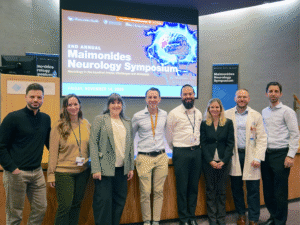Immunotherapy and the introduction of monoclonal antibodies revolutionized cancer therapy. Now, there’s another step forward — bi-specific T-cell engagers (BiTEs). These two-pronged antibodies bring a patient’s T-cells together with cancer cells to improve the effectiveness of cancer treatments.
Maimonides Cancer Center is leading the way in oncology care with BiTEs immunotherapy. The center will soon be one of the only hospitals in Brooklyn to offer this groundbreaking treatment option, making cutting-edge cancer therapeutics more convenient for patients close to home.
“Immunotherapy is the most exciting area of oncology and hematology today,” said Jay Lipshitz, MD, a Maimonides oncologist and hematologist. “With this type of engineered antibody, it’s easier for T cells to attack cancer. This is the direction that cancer therapy is going.”
What is BiTEs Immunotherapy?
Like monoclonal antibodies, BiTEs target specific antigens. But there’s one key difference — BiTEs can link to two antigens simultaneously. One half of the antibodies’ “Y” shape attaches to an antigen on cancer cells, and the other half of the “Y” binds with a protein called CD3 on the surface of the patient’s T cells.
“With an antibody that has one part that recognizes a cancer cell and another part that recognizes the T cell, we can bring the T cell and cancer cell into close proximity,” Dr. Lipshitz said. “BiTEs physically introduce the two cells and allow the T cell to attack the cancer cell more easily.”
The immunotherapy is FDA-approved to treat various hematological cancers, including multiple myeloma, lymphoma, and leukemia. To date, there are seven approved BiTEs on the market. Research efforts are also underway to expand BiTEs to solid tumor treatment.
Targeting Tough Leukemias with BiTEs Therapy
Although BiTEs are FDA-approved, they are not yet considered to be frontline therapies. Patients are candidates for this type of immunotherapy only if other existing treatments haven’t stopped their disease progression. Maimonides providers plan to use blinatumomab (Blincyto) — one of the seven approved BiTEs — to treat pediatric and adult patients who have therapy-resistant B cell-derived acute lymphoblastic leukemias. Other BiTEs will be used for their FDA-approved indications in multiple myeloma and lymphoma.
With any BiTEs therapy, patients usually receive their first doses via infusion or injection in an inpatient setting. This way providers can supervise therapy administration and monitor patients for side effects. Subsequent doses are delivered in an outpatient setting on a weekly or biweekly basis. Some patients may need continuous infusions through a wearable pump for several weeks.
Lipshitz said it’s vital to examine a patient’s overall health before prescribing BiTEs therapy. The patient’s condition will determine the best dosage and treatment frequency.
“We must consider whether a patient has other comorbidities like heart or lung conditions. Those individuals may be at higher risk for complications from this immunotherapy,” Dr. Lipshitz said. “But they are also some of the patients who are most likely to benefit from it.”
Understanding BiTEs Therapy: High Efficacy with Controllable Side Effects
Existing research and clinical evidence show that BiTEs can help many patients achieve full remission. But significant side effects are possible, Dr. Lipshitz said. Some patients can experience cytokine release syndrome (CRS), an overreaction of the immune system. Others may develop immune effector cell-associated neurotoxicity syndrome (ICANS), a neuropsychiatric syndrome that causes confusion and impairs fine motor function and speech.
These side effects typically appear only after the first couple of doses. Fortunately, the immunosuppressive drug tocilizumab or steroids can most often treat CRS and ICANS effectively, and ICANS can generally be treated with steroids.
“These conditions are the reason why we initially provide BiTEs immunotherapy in an inpatient setting. But once a patient has graduated to an outpatient setting, they experience few side effects,” Dr. Lipshitz said. “BiTEs are very well tolerated once patients get through an initial dose period.”
From that point on, the most significant concern is monitoring patients for any signs of infection.
Maimonides to Enhance Cancer Treatment with BiTEs Immunotherapy Integration
Within the next six months, Maimonides expects to introduce BiTEs therapy to its arsenal of hematologic cancer treatments, which includes chemotherapy, radiation, and monoclonal antibody immunotherapy. Maimonides has invested in significant training to prepare the multidisciplinary team of experts caring for these patients — a group that includes hematology oncologists, other specialists, nurse practitioners, pharmacists, inpatient and outpatient nurses, and the primary care providers who refer patients.
Each provider with direct patient contact received training on recognizing and documenting CRS and ICANS. Maimonides also built order sets in the electronic medical record to streamline medication administration to combat these side effects.
“We’ve created another excellent collaborative care environment,” Dr. Lipshitz said. “As a hospital, we’re bringing together the specialties that may be needed to manage these side effects.”
Maimonides also goes a step further — patients receive magnets that include contact information for every member of their care team, and a financial team is available to help patients navigate any insurance questions since BiTEs immunotherapy is new. Social workers can also help patients find transportation to and from the hospital and infusion center. These efforts will improve access to care and support patients in finding treatment closer to home.
Ultimately, Dr. Lipshitz said, BiTEs immunotherapy will do more than enhance cancer care for individual patients at Maimonides; implementing this therapy will also improve the quality and breadth of cancer treatment overall.
“There’s enough evidence to show BiTEs improve survival in many scenarios. It’s still such a new therapy approach, and as a field, we’re exploring how to best use it,” he said. “In the future, I think these immunotherapies will improve cure rates.”
Learn more about Maimonides Cancer Center or call (718) 765-2500 to make a referral.




